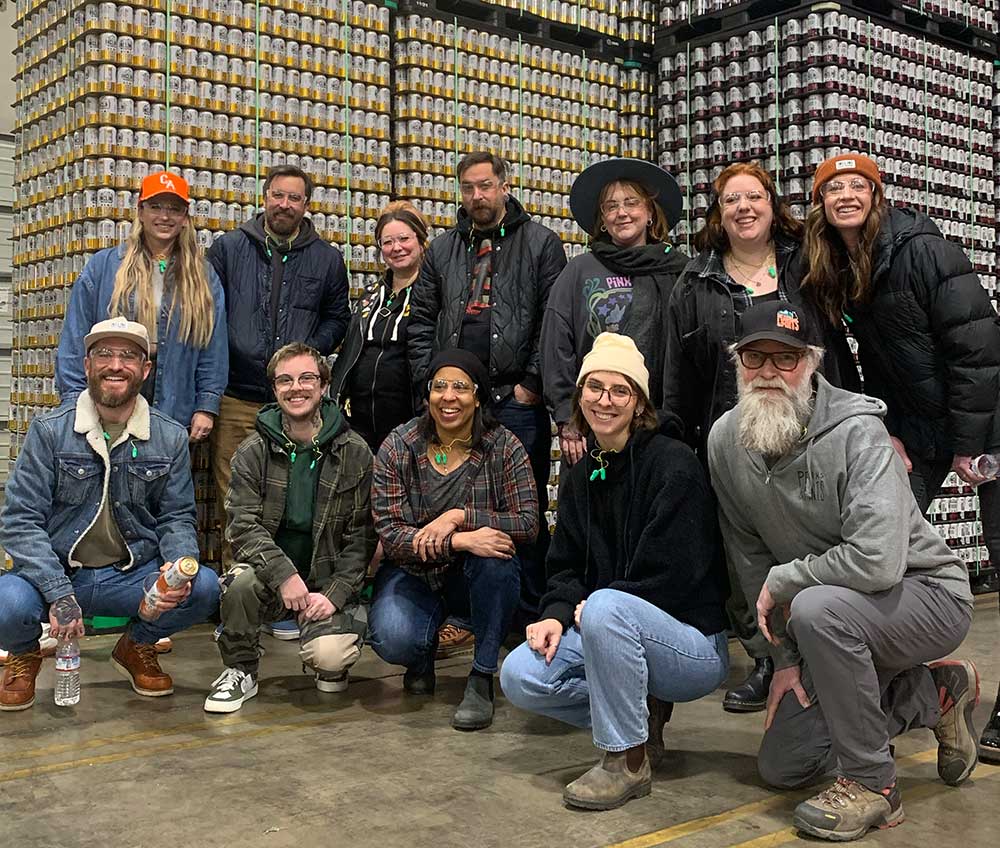
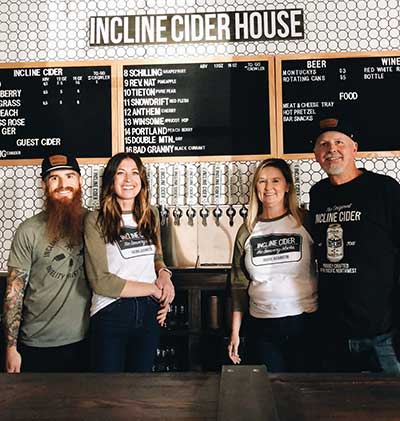
Incline Cider sets up Basecamp Proctor through 2025
Incline Cider Company began in an Arizona laundry room.
“I began making cider as a hobby,” explains Jordan Zehner, co-owner of Incline Cider Company. “It started in Lesley & I’s laundry room. Experiments with different fruits, juices, and yeasts. I have always been an avid beer lover, so naturally, I put hops into everything, translating into how we make many of our ciders today. It went from ambient temperature fermentations in the laundry room to temperature controlled in a dedicated fermenting fridge in the garage, and then, as any homebrewer knows, bottling all that stuff is taxing, so I quickly got into kegging and always having it available on a kegerator at the house.”
Jordan’s second job was as a Southern Glazers Wine & Spirits sales representative in Arizona. “I spent most of my time in off-premise retail accounts and grocery stores, getting familiar with what a product goes through from creation to ending up in a customer’s hands,” he explains. “From a sales rep, I worked my way to a division manager role, followed by a director of sales role, really getting immersed in the distributor side of things, arguably the most significant role in bringing products to market. After about 5 years at Southern Wine & Spirits, I was hired by Beam Suntory as their off-premises channel manager for Arizona, getting immersed in the supplier side of the business.”
Jordan learned almost every level of distributorship and the alcohol business. His father, Chris, had been in the wine business for 30 years and could check off every experience his son encountered himself. The common thread was sales—starting from nothing and ultimately seeing completion through the retail shelves and into the home refrigerator.
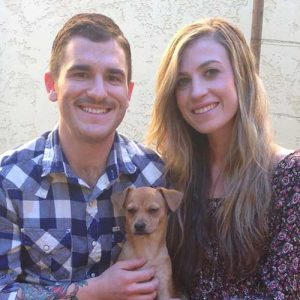
The incline toward Incline Cider
Chris and his wife, Teresa, would visit Jordan and Lesley and have backyard brainstorming sessions over fresh cider. Discussions would often turn to hard cider, which Arizona, and most of the country, was limited to Vermont-made Woodchuck or Wyder’s in the grocery coolers. A rare craft cider would make its way to a specialty shop. The foursome would stare toward the blue sky and take another sip of craft cider.
“There wasn’t anything available at major retail except for the handful of national brands at the time, so it was fun to make something that was kind of hard to consistently get your hands on, a cider made from wholesome ingredients without a bunch of added sugars or sweetness,” says Jordan. “Chris was just getting into exploring and enjoying drinking cider and would argue what I was making was better than what he could go out and buy, so anytime he was in town to visit, he was always stoked to know I had a few kegs of the good stuff.”
Cider, often referred to as hard cider, is a fermented, alcoholic beverage made from the juice of apples. It dates to the Romans in 55 BC. Still, the beverage became a popular alternative in 13th-century Europe because it was safer to drink than water and touted for its health benefits to aid digestion and prevent gout, bladder infections, fevers, and any ailment you can imagine. With roots in Europe, the delicious libation was insanely popular in the United States, but cider consumption declined after Prohibition. During the 1920s, the apples planted were great for eating raw or in pie, which any cider aficionado knows is not suitable for cider. But cider returned with more cider makers and houses popping up across North America, including the Zehner’s Incline Cider Company.
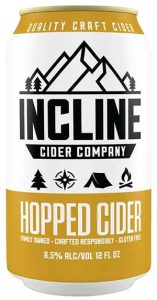
Chris and Jordan had all the tools they needed to launch Incline Cider in 2015. Jordan knew you start with apples, but not all apples are created equal. He knew most cider is made from cider apples, which are grown specifically to make the beverage. Cider apples have high levels of sugar and tannins, which are desirable for fermentation and provide rich aromas and complex structure to the beverage. The duo knew how to launch a product from idea to home fridge. Their life and business partners, Teresa and Lesley, respectively, also knew people management plus design.
“From having a style of cider that I liked to make and that we both enjoyed, we took our experience in the industry and began developing a plan to start a business together and bring it to life potentially,” Jordan continues. “We had both launched dozens and dozens of products through distributors and suppliers over the years, so although knowing it was going to be tough from the jump, we figured if anyone could do it, why not us? We should have as good a shot as any.”
Chris Zehner had worked in the wine business for almost three decades. He began his career at Gallo, and then with Chateau St Michelle, followed by Robert Mondavi, and lastly, at Delicato Family Vineyards. Chris’ career was focused on retail and building brands on the national level. At Delicato Family Vineyards, he was the vice president of national chains and oversaw their chain retail business for the US. “Recurring theme for Chris and me,” adds Jordan. “We both knew and lived in the retail and distributor world, which greatly influenced how we thought to launch and hopefully succeed with Incline.”
If two people could take an emerging cider industry and launch a cider from the ground up, it would be Chris and Jordan Zehner.
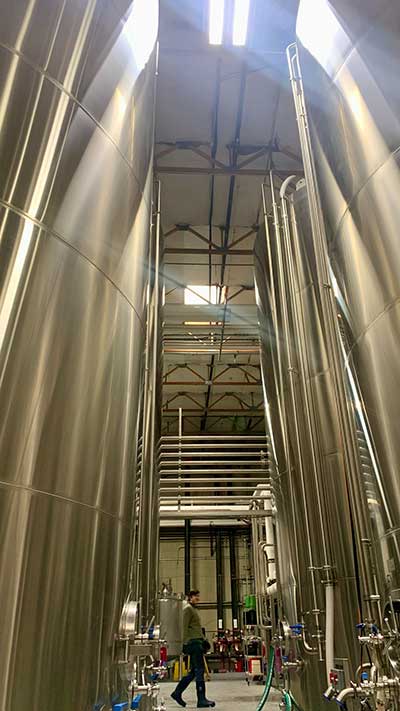
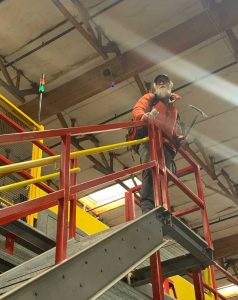
Schilling was so money
Their Incline Cider business plan didn’t involve any Arizona garages.
“We weren’t going to open up a little garage cidery but slowing build up from there,” explains Jordan. “With our backgrounds … if we can make a delicious product and get it out there in a big way, it’s going to win or it’s going to lose. The customers must speak with their wallets. If they like it and return to buy it, the rest will be history. And, if not, at least we tried.”
In 2014, Jordan met Colin Schilling, CEO of Schilling Cider, at the Cider Summit in Portland. The Schilling was the first large cidery that didn’t close the door on Jordan’s idea of contract brewing on a big system with a canning line. The two met. Schilling said yes. The Zehners gave him all their money for a 200-barrel batch of cider, which is 2,700 cases. Chris and Jordan had one cider, a hopped cider called Hopped. The Schilling plant was half the size it is today. Schilling Cider opened in 2012 and quickly ran out of space. They used satellite warehouses to store materials like empty cans and cases. In 2014, they moved to their current warehouse in Auburn. The larger space allows them to store enough apples to fresh press them year-round. Adding four 200-barrel tanks allowed them to take on contract clients like Incline. When Incline made its first batch in 2015, Schilling had no canning line and limited raw ingredient storage. Schilling Cider’s warehouse in Auburn, Washington, is 110,000 square feet today, making it the largest fresh-pressed cider production facility in the United States.
“Going into the cider industry, if you’re going only to make one thing, Hopped is probably not going to be the recipe to success,” Jordan laughed. They proved it wasn’t true. “We’ve had a hopped cider in the market for a decade now.” Incline is still one of the few hopped ciders on the shelves.
Hopped did land a few grocery store placements — Albertsons and Safeways in Oregon. It snowballed from there — slowly and honestly.
Incline and schilling grew exponentially together. If you combine the two cider companies, they would be the country’s first or second biggest cidermaker. That’s a lot of firepower under one roof.
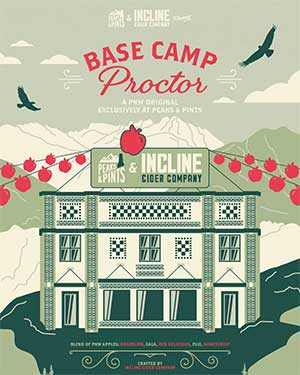 Setting up Basecamp Proctor
Setting up Basecamp Proctor
A year ago, Peaks & Pints co-owner Ron Swarner asked Jordan and Lesley if they would be interested in brewing our 2024-25 fourth house cider following in the Johnny Appleseed footsteps of Double Mountain Cidery Tossed Apples (2021-22), Yonder Cider House of Yonder, and 2 Towns Ciderhouse RiverBreaker pouring from our Tap #7. Incline makes delicious, crushable cider, many from a dry-hopped apple base to pull out citrus aromas. They use 100 percent fresh pressed apples, no added sugar, and no carbonated water, and the result is balanced ciders are not too sweet and super flavorful. In 2019, they opened the Incline Cider House in Tacoma’s Historic Brewery District. The traditional-style bar allows an authentic cider experience by offering 16 tap handles of eight to 10 Incline ciders and additional rotating Washington and Northwest ciders. Their cider chops, marketing prowess, proximity to Peaks & Pints, and love of the outdoors and hiking made them an ideal candidate for our dry house cider. The Zehners and Swarner tasted several batches and agreed on a blend of their favorite Pacific Northwest-grown apples — Fuji, Gala, Honeycrisp, Red Delicious, and Braeburn — packs layers of bold, juicy apple flavor into every tulip glass. The name Basecamp Proctor fits both our ideals. Incline Basecamp proctor Dry Cider has a permanent handle on Peaks & Pints’ Western redcedar tap log through Nov. 1, 2025.
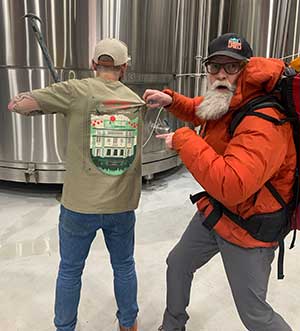
Lesley jumped into action. From her many years managing customer service, she knows it’s not just about the liquid—it’s about feelings. She created Basecamp Proctor posters, T-shirts for the staff, product detail materials, and a slew of upcoming Basecamp Proctor celebrations. She organized a tour of the Schilling plant and their taproom in Tacoma’s Historic Brewery District for the Peaks & Pints staff. She also works with local Foster’s Creative on design and video elements around the cider.
Tacoma Beer Week Incline Tap Takeover
You can expect every iteration of craft beer imaginable to be available somewhere during Tacoma Beer Week 2025, including barrel-aged, lambic, experimental, and rare brews. You can also expect your cider to need to be addressed. Call us a Winesap, but Peaks & Pints is ready for a Bittersharp. The craft beer and cider bar, bottle shop, and taproom in Tacoma’s Proctor District is bringing back our cider tap takeover to anchor this year’s Tacoma Beer Week. And, to bury the lead, we’re lining up our tap log with Incline Cider tap handles. From open to close on Sunday, March 9, we tap 10 or so Incline ciders, providing a refreshing contrast on your palate.
Peaks & Pints Tacoma Beer Week 2025 events
March 1, 2-4 p.m.: Pouring It Forward: Beach Cleanup After Party with Silver City Brewery
March 1, 6-9 p.m.: Pouring It Forward: Proctor Polar Bear Crawl After Party with Drinking for Conservation at 7 Seas Brewing
March 4, 5-8 p.m.: Pouring It Forward: benefit for Tacoma Tree Foundation with Loowit Brewing
March 5, 3-6 p.m.: Grit & Grain Podcast with Lander Coffee and Logan Brewing
March 6, 5-8 p.m.: Pouring it Forward: Benefit for Tacoma Arts Live with a Plant Swap with Living Haus Beer
March 7, 5-8 p.m.: Pouring It Froward: Fundraiser for Multicare Mary Bridge Children’s Hospital Facility Dog Program with Great Notion Brewing
March 9, all day: Tacoma Beer Week 2025 Finale with Incline Cider Tap Takeover
